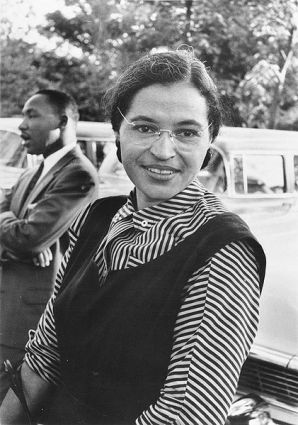Everyday is Black History: Rosa Parks (Feb 4,1913- Oct 25,2005)
Born on February 4, 1913, Rosa Parks, the mother of the Civil Rights Movement, was born in Tuskegee, Alabama as Rosa Louise McCauley. Her family background was diverse, a blend of African-American, Scots-Irish and Cherokee-Creek. After her parents, James and Leona, separated, Rosa and her family moved to Montgomery, Alabama, where she attended several schools until forced to care for her ailing grandmother and later, for her mother, too.
At the time, Alabama practiced the segregation of the ‘Jim Crow’ laws. This included separate seating arrangements on public transportation. Buses had a section for whites-only in the front of the bus, while blacks had to sit in the back of the bus. Rosa recalls “I’d see the bus pass every day… But to me, that was a way of life, we had no choice but to accept what was the custom. The bus was among the first ways I realized there was a black world and a white world.â€
In 1932, Rosa married Raymond Parks, a barber who was a member of the NAACP. She later joined herself in 1943 and became very active in the Civil Rights Movement in Montgomery. While working at the Maxwell Air Force Base in 1944, Rosa got a taste of what life was like in a non-segregated world. Being Federal property, there was no racial divisions, even the trolley Rosa rode to work each day was integrated. After the war, Rosa continued to work with the NAACP and the Voters League to push for equality. As the years unfolded, tensions began to escalate.
In 1955, the murder of Emmett Till, a 14-year old boy accused of flirting with a 21-year old white woman, raised much attention and outrage. This was followed by the murders of two activists in the Civil Rights Movement, George W. Lee and Lamar Smith. Four days after attending a rally to protest their murders, Rosa boarded Bus No. 2857 on December 1, 1955. She sat in the 5th row of the bus, which was not a designated ‘whites-only’ seat, only the first four rows were. But as the bus picked up more passengers, there were not enough for all of the whites. The bus driver, James F. Blake, moved the sign designating where blacks could sit back to make room, but Rosa Parks refused to give up her seat. Blake called police and had her arrested.
Rosa Parks was charged with violating Chapter 6, Section 11 of the segregation law of Montgomery City. She was bailed out the next day and supporters quickly organized and rallied to her defense. On Dec. 5, 1955, a trial was held and she was found guilty of violating the segregation law and of disorderly conduct. She was fined $10 plus a $4 court fee. Meanwhile, a boycott of the transit system had been organized at a local Montgomery church, and formed a group, the Montgomery Improvement Association. It’s president was elected and he was Martin Luther King Jr.
About 75% of the Montgomery transit system’s customers had been African-Americans. The boycott lasted 381 days, costing the bus company a great deal of money. Lawsuits were filed against the transit company and the city of Montgomery. Other black women who had been denied seats were included. The case, Browder vs Gayle, worked it’s way up the Federal justice system to the U.S. Supreme Court. On November 13, 1956, the court ruled against the city of Montgomery and declared racial segregation of the bus system as unconstitutional. The picture below shows Rosa Parks legally riding in the front of the bus on December 21, 1956.
Rosa Parks remained active in the Civil Rights Movement. In 1957, she and her family moved to Hampton, Virginia, then later to Detroit, Michigan. In 1965, Rosa Parks was hired as a secretary to the then newly elected Congressman, John Conyers, a position she worked until retiring in 1988. So let us remember by celebrating Rosa Parks for her stand on equality. The history of Rosa Parks’ life can be seen in many places across America, with streets and even a Rosa Parks Middle School named after her. Rosa Parks and Civil Rights will always be remembered in the same breath.



